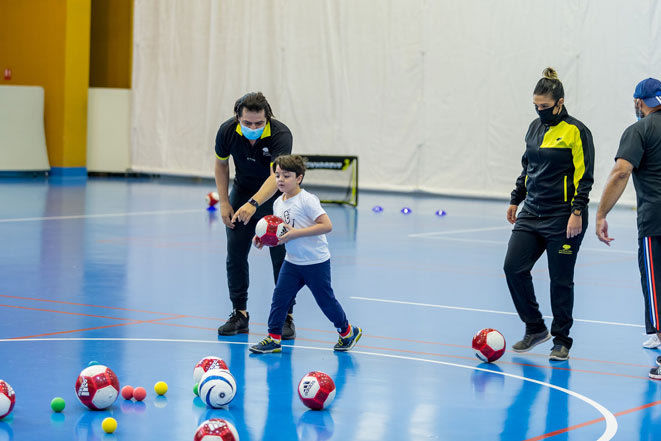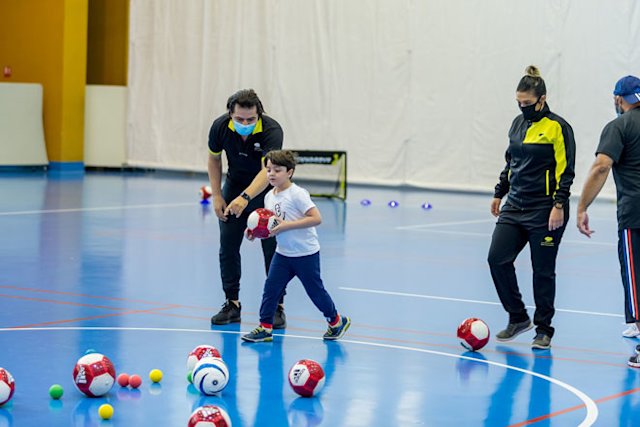A New Vision for Education
Over the past quarter of a century, QF has built an ecosystem of education like no other in the world – and in March, the vision for its future was unveiled in the form of QF’s new higher education strategy.
Student-focused and designed to drive disruptive education, the strategy aims to make the Education City learning experience even more tailored to individual needs than ever before, and intertwine QF’s higher education institutions with its schools and research hubs.
Steered by QF’s new Higher Education division – led by experienced education expert Francisco Marmolejo, whose appointment as the organization’s President of Higher Education was announced in March – the strategy will also create new collaboration opportunities for QF’s partner universities, strengthen Hamad Bin Khalifa University’s position as an innovation hub, and pave the way for a string of flagship initiatives.
“Education faces a choice between remaining static and risking stagnation, or flowing continuously toward the pursuit of knowledge,” said Her Excellency Sheikha Hind bint Hamad Al Thani, Vice Chairperson and CEO of Qatar Foundation. “With our new vision for higher education, QF is choosing the latter.”
Over the past quarter of a century, QF has built an ecosystem of education like no other in the world – and in March, the vision for its future was unveiled in the form of QF’s new higher education strategy.
Student-focused and designed to drive disruptive education, the strategy aims to make the Education City learning experience even more tailored to individual needs than ever before, and intertwine QF’s higher education institutions with its schools and research hubs.
Steered by QF’s new Higher Education division – led by experienced education expert Francisco Marmolejo, whose appointment as the organization’s President of Higher Education was announced in March – the strategy will also create new collaboration opportunities for QF’s partner universities, strengthen Hamad Bin Khalifa University’s position as an innovation hub, and pave the way for a string of flagship initiatives.
“Education faces a choice between remaining static and risking stagnation, or flowing continuously toward the pursuit of knowledge,” said Her Excellency Sheikha Hind bint Hamad Al Thani, Vice Chairperson and CEO of Qatar Foundation. “With our new vision for higher education, QF is choosing the latter.”
Education faces a choice between remaining static and risking stagnation, or flowing continuously toward the pursuit of knowledge
8 universities are part of the QF ecosystem
Collaborating for Climate Action
In the face of the threat posed by climate change, and with the goal of advancing solutions to Qatar’s own unique environmental challenges, QF and energy and sustainable development think tank The Al-Attiyah Foundation joined forces in March.
Through a partnership spanning education and research, the two organizations will combine to develop a new bank of knowledge on key climate change topics that will support policies and actions in Qatar, together with a digital platform providing the nation’s community with Qatar-customized climate change information – raising public awareness about the issue, and its urgency.
The announcement of the collaboration also revealed its first project – a joint climate change conference, debuting later in 2021 and the first to be held in Qatar, for Qatar.
“We are in a period of growing international debate on energy transition and its implications for climate change,” said His Excellency Abdullah Bin Hamad Al-Attiyah, Chairman of The Al-Attiyah Foundation. “This collaboration will be the first step to ensuring that the convening power of both Foundations is leveraged to contribute toward a zero-carbon world.”
In the face of the threat posed by climate change, and with the goal of advancing solutions to Qatar’s own unique environmental challenges, QF and energy and sustainable development think tank The Al-Attiyah Foundation joined forces in March.
Through a partnership spanning education and research, the two organizations will combine to develop a new bank of knowledge on key climate change topics that will support policies and actions in Qatar, together with a digital platform providing the nation’s community with Qatar-customized climate change information – raising public awareness about the issue, and its urgency.
The announcement of the collaboration also revealed its first project – a joint climate change conference, debuting later in 2021 and the first to be held in Qatar, for Qatar.
“We are in a period of growing international debate on energy transition and its implications for climate change,” said His Excellency Abdullah Bin Hamad Al-Attiyah, Chairman of The Al-Attiyah Foundation. “This collaboration will be the first step to ensuring that the convening power of both Foundations is leveraged to contribute toward a zero-carbon world.”
We are in a period of growing international debate on energy transition and its implications for climate change
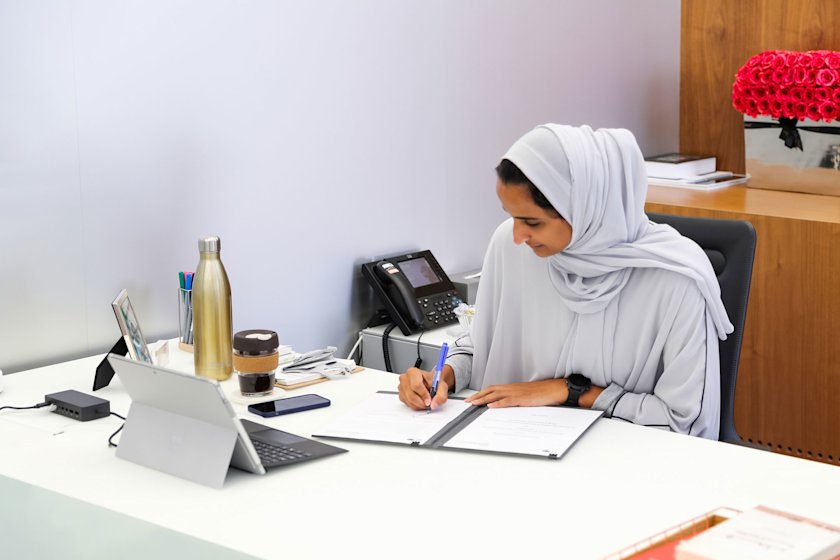
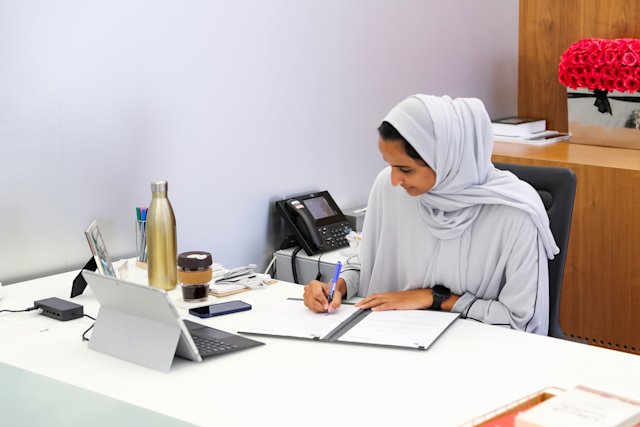
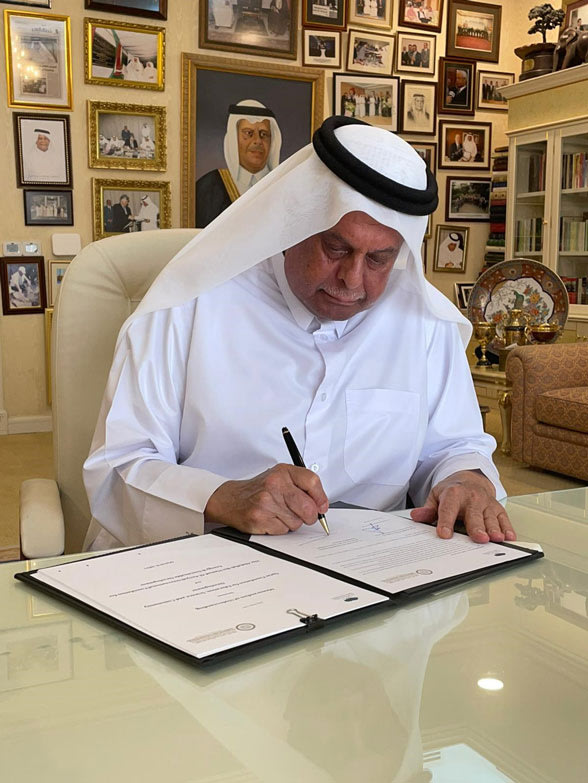

Filling a Knowledge Gap
In the quest to develop personalized, precision medicine, diagnostic tools play a vital role. And one of them has the potential to enable highly individualized diagnosis, prognosis, and treatment – by using our saliva.
In March, a research group led by Dr. Souhaila Al Khodor, Director of the Maternal and Child Health Program in QF member Sidra Medicine’s Research Department reported the first-ever salivary microbiome composition among the Qatari population, using data from 1,000 participants in QF member Qatar Genome Programme’s population-based precision medicine project.
As Dr. Al Khodor explained, saliva “acts as a mirror for the body’s health”, and can be used to identify and create a comprehensive database of biomarkers that signal the presence of a disorder. Once catalogued, changes in biomarker levels, can be key to maintaining wellbeing and early detection of diseases.
Previous studies of variations in the salivary biome have not taken into account the Arab and Qatari populations, and Dr. Al Khodor said: “If data representing Arabs is missing, the first responsibility to fill that gap lies with us as Arab scientists.”
In the quest to develop personalized, precision medicine, diagnostic tools play a vital role. And one of them has the potential to enable highly individualized diagnosis, prognosis, and treatment – by using our saliva.
In March, a research group led by Dr. Souhaila Al Khodor, Director of the Maternal and Child Health Program in QF member Sidra Medicine’s Research Department reported the first-ever salivary microbiome composition among the Qatari population, using data from 1,000 participants in QF member Qatar Genome Programme’s population-based precision medicine project.
As Dr. Al Khodor explained, saliva “acts as a mirror for the body’s health”, and can be used to identify and create a comprehensive database of biomarkers that signal the presence of a disorder. Once catalogued, changes in biomarker levels, can be key to maintaining wellbeing and early detection of diseases.
Previous studies of variations in the salivary biome have not taken into account the Arab and Qatari populations, and Dr. Al Khodor said: “If data representing Arabs is missing, the first responsibility to fill that gap lies with us as Arab scientists.”
If data representing Arabs is missing, the first responsibility to fill that gap lies with us as Arab scientists
QF member Qatar Biobank’s second International Biobanking Conference in March:
- Drew over 4,300 attendees from 40 countries
- Hosted over 40 scientists and biobanking and precision medicine experts
- Was held under the theme ‘Biobanks for Precision Care – Lessons Learned from Global Crises’
Supporting the Fight Against COVID-19
One year on from the full impact of the COVID-19 pandemic hitting home in Qatar, Sidra Medicine’s precision medicine efforts saw its researchers make a discovery that could support the design of future vaccines for tackling new variants of the novel coronavirus.
The hospital and medical research center’s Precision Medicine Program identified spots within the virus that do not mutate, known as “coldspots”, and opened up new perspectives on which sites within the virus can be best targeted. The study can also help in designing mutation-free antivirals.
“The fight against COVID-19 is constantly evolving,” said Dr. Khalid Fakhroo, Chief Research Officer, Sidra Medicine. “To resolve this global healthcare challenge in such critical times, we have to understand the viral defense mechanism of such mutations.
“Our findings further this understanding and align with Sidra Medicine’s ambition to deliver precision medicine.”
Meanwhile, Sidra teams identified a new mutation in the coronavirus genome that may affect COVID-19 testing, with the study acting as a worldwide call to ensure testing systems are up to date and capable of detecting all virus variants.
One year on from the full impact of the COVID-19 pandemic hitting home in Qatar, Sidra Medicine’s precision medicine efforts saw its researchers make a discovery that could support the design of future vaccines for tackling new variants of the novel coronavirus.
The hospital and medical research center’s Precision Medicine Program identified spots within the virus that do not mutate, known as “coldspots”, and opened up new perspectives on which sites within the virus can be best targeted. The study can also help in designing mutation-free antivirals.
“The fight against COVID-19 is constantly evolving,” said Dr. Khalid Fakhroo, Chief Research Officer, Sidra Medicine. “To resolve this global healthcare challenge in such critical times, we have to understand the viral defense mechanism of such mutations.
“Our findings further this understanding and align with Sidra Medicine’s ambition to deliver precision medicine.”
Meanwhile, Sidra teams identified a new mutation in the coronavirus genome that may affect COVID-19 testing, with the study acting as a worldwide call to ensure testing systems are up to date and capable of detecting all virus variants.
Sidra Medicine’s scientific departments focus on:
- Human Genetics
- Immunology
- Cancer
- Maternal and Child Health
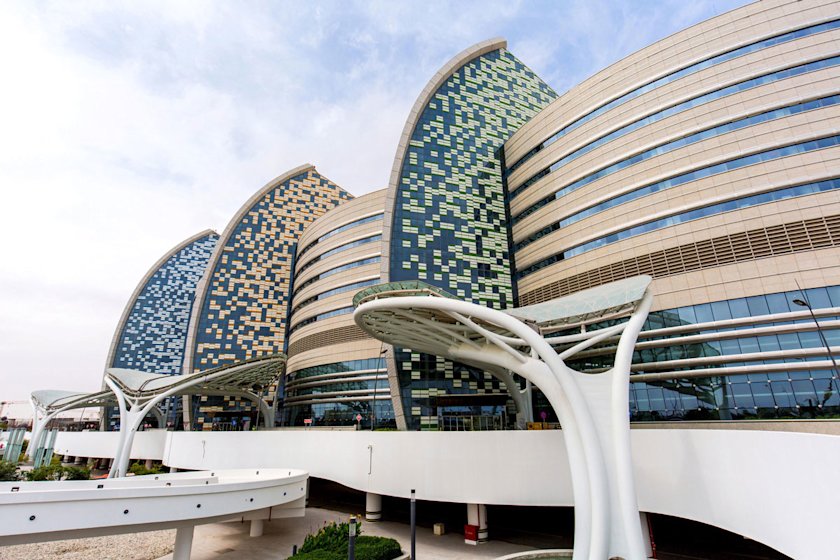
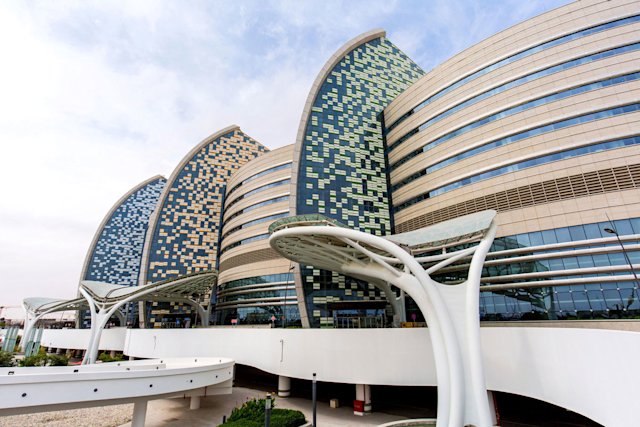
A Greater Understanding
On the medical science front, March saw researchers at QF partner university Weill Cornell Medicine-Qatar (WCM-Q) outline the possibility of repurposing metformin – a common diabetes drug –to provide protection for diabetic COVID-19 patients.
And scientists from WCM-Q, HBKU, and the Qatar Genome Research Consortium produced the first genetic association study in the Middle East – published in leading scientific journal Nature Communications – which provides a greater understanding of genetic risk factors that are specific to the Arab population.
Analyzing whole genome sequence data from more than 6,000 Qataris, the project’s outcomes have been publicly shared, ensuring that the unique characteristics of Arab genomes are considered in future research into precision treatments and therapies.
“The study identifies, for the first time, genetic variations that are specific to the population of Qatar,” said Omar Albagha, principal investigator from HBKU’s College of Health and Life Sciences.
“It also shows that findings from genetic studies in European populations don’t translate well when applied to our Middle East population. We are excited because the study provides a foundation for the implementation of precision medicine in the Middle East.”
On the medical science front, March saw researchers at QF partner university Weill Cornell Medicine-Qatar (WCM-Q) outline the possibility of repurposing metformin – a common diabetes drug –to provide protection for diabetic COVID-19 patients.
And scientists from WCM-Q, HBKU, and the Qatar Genome Research Consortium produced the first genetic association study in the Middle East – published in leading scientific journal Nature Communications – which provides a greater understanding of genetic risk factors that are specific to the Arab population.
Analyzing whole genome sequence data from more than 6,000 Qataris, the project’s outcomes have been publicly shared, ensuring that the unique characteristics of Arab genomes are considered in future research into precision treatments and therapies.
“The study identifies, for the first time, genetic variations that are specific to the population of Qatar,” said Omar Albagha, principal investigator from HBKU’s College of Health and Life Sciences.
“It also shows that findings from genetic studies in European populations don’t translate well when applied to our Middle East population. We are excited because the study provides a foundation for the implementation of precision medicine in the Middle East.”
The study provides a foundation for the implementation of precision medicine in the Middle East
The College of Health and Life Sciences has 5 graduate programs
New Dimensions in Technology
Qatar’s first facility for 3D printing concrete and buildings was unveiled in March – with a QF partner university at the heart of its operation.
Texas A&M University at Qatar (TAMUQ) and Al Jaber Trading and Contracting launched a partnership in 2020 that brought advanced technology enabling buildings to be 3D printed to Qatar. The concrete produced at the facility will be sustainable, designed to withstand Qatar’s environment, and printed within minutes without the need for molds.
“Our goal is to use this technology for rapid, sustainable construction in Qatar, and reduce construction waste,” said Dr. Eyad Masad, professor in TAMUQ’s Mechanical Engineering Program, who was instrumental in bringing the technology to Qatar. “It is adding new capabilities to Qatar’s construction industries.”
Under the partnership, TAMUQ is leading the research aspect and providing expertise on the behavior of materials, with JTC providing technical expertise and ways of delivering the outcomes of TAMUQ’s research to construction firms in Qatar.
Qatar’s first facility for 3D printing concrete and buildings was unveiled in March – with a QF partner university at the heart of its operation.
Texas A&M University at Qatar (TAMUQ) and Al Jaber Trading and Contracting launched a partnership in 2020 that brought advanced technology enabling buildings to be 3D printed to Qatar. The concrete produced at the facility will be sustainable, designed to withstand Qatar’s environment, and printed within minutes without the need for molds.
“Our goal is to use this technology for rapid, sustainable construction in Qatar, and reduce construction waste,” said Dr. Eyad Masad, professor in TAMUQ’s Mechanical Engineering Program, who was instrumental in bringing the technology to Qatar. “It is adding new capabilities to Qatar’s construction industries.”
Under the partnership, TAMUQ is leading the research aspect and providing expertise on the behavior of materials, with JTC providing technical expertise and ways of delivering the outcomes of TAMUQ’s research to construction firms in Qatar.
TAMUQ houses 5 research centers, focusing on:
- Gas and fuels
- Process safety
- Sustainable water and energy
- Smart grids
- Advanced scientific computing
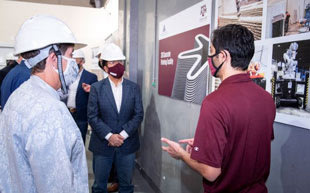

Advancing Equine Healthcare
It’s not only humans who suffer from the flu. Horses do, too. But a QF vet managed to solve the riddle of a mystery bug afflicting Arabian foals.
When Dr. Camilla Jamieson joined QF’s Equine Veterinary Medical Center (EVMC), she noticed some foals were not recovering from ‘colds’ through the usual treatments. By using endoscopic exams and ultrasound scans, the senior clinical veterinarian found the source of their illness was a bacterial infection in the guttural pouch – a horse’s natural cooling system – and by cleaning this, the foals improved almost overnight.
And in March, fellow EVMC vet Dr. Jessica Johnson gave an insight into a project she started to address Laminitis – one of the most painful foot diseases among horses, which the Arabian breed is especially predisposed to. Using X-ray images, she aims to create the first reference for normal foot measurements in Arabian horses, allowing earlier diagnosis and prevention of Laminitis.
“The Arabian breed has been selected to look and perform a certain way, which inadvertently gives rise to certain health conditions,” said Dr. Johnson. “And Laminitis is certainly one of those.”
It’s not only humans who suffer from the flu. Horses do, too. But a QF vet managed to solve the riddle of a mystery bug afflicting Arabian foals.
When Dr. Camilla Jamieson joined QF’s Equine Veterinary Medical Center (EVMC), she noticed some foals were not recovering from ‘colds’ through the usual treatments. By using endoscopic exams and ultrasound scans, the senior clinical veterinarian found the source of their illness was a bacterial infection in the guttural pouch – a horse’s natural cooling system – and by cleaning this, the foals improved almost overnight.
And in March, fellow EVMC vet Dr. Jessica Johnson gave an insight into a project she started to address Laminitis – one of the most painful foot diseases among horses, which the Arabian breed is especially predisposed to. Using X-ray images, she aims to create the first reference for normal foot measurements in Arabian horses, allowing earlier diagnosis and prevention of Laminitis.
“The Arabian breed has been selected to look and perform a certain way, which inadvertently gives rise to certain health conditions,” said Dr. Johnson. “And Laminitis is certainly one of those.”
QF’s Equine Veterinary Medical Center provides specialized services for horses, including:
- Surgery
- Internal medicine
- Sports medicine and rehabilitation
- Reproduction
- Dentistry
- Diagnostic imaging
- Anesthesia
- Podiatry
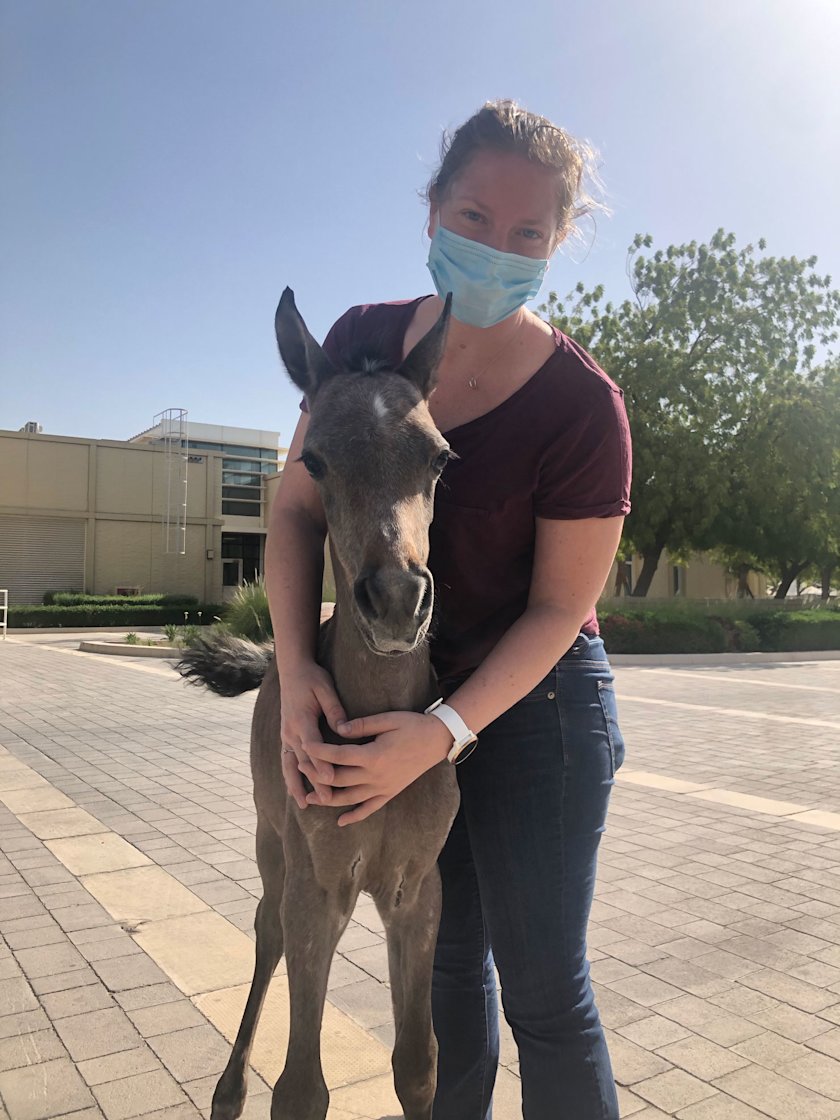
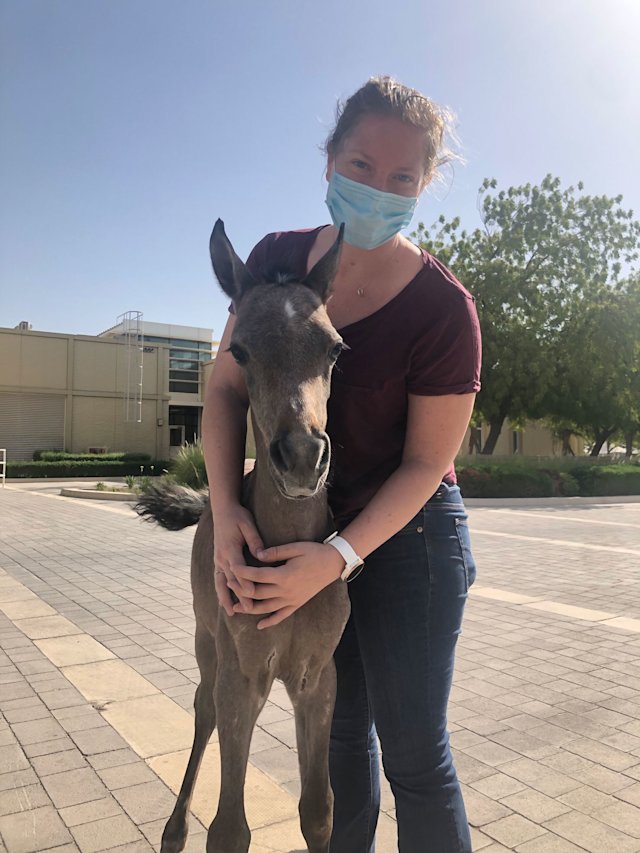
Shining a Light
Students from QF set out to give a voice to under-represented people and topics from the Global South, contributing content on cultural, social, and political topics to Wikipedia through their intercultural and international communication class at Northwestern University in Qatar, a QF partner university.
“Not only are issues concerning the Global South not well addressed on Wikipedia, they are also in need of improvement,” said Northwestern Qatar professor Banu Akdenizli, who teaches the course and says the students’ multilingual writing and research skills makes them ideally placed to help “decolonize Wikipedia”.
At another QF partner university – Virginia Commonwealth University School of the Arts in Qatar (VCUarts Qatar) – a new creative space called the TinkerLab was opened up to artists, designers, and innovators, offering everything from a sewing machine and papermaking equipment to precision tools and digital microscopes.
During the month, VCUarts Qatar faculty member and filmmaker Maysaa Almumin saw her short film ‘AL-SIT’ win the top award at Finland’s Tampere International Film Festival – qualifying it for the Academy Awards – while university alumna Hazem Asif’s works began to appear on the cover of prestigious medical journal The Lancet HIV.
Students from QF set out to give a voice to under-represented people and topics from the Global South, contributing content on cultural, social, and political topics to Wikipedia through their intercultural and international communication class at Northwestern University in Qatar, a QF partner university.
“Not only are issues concerning the Global South not well addressed on Wikipedia, they are also in need of improvement,” said Northwestern Qatar professor Banu Akdenizli, who teaches the course and says the students’ multilingual writing and research skills makes them ideally placed to help “decolonize Wikipedia”.
At another QF partner university – Virginia Commonwealth University School of the Arts in Qatar (VCUarts Qatar) – a new creative space called the TinkerLab was opened up to artists, designers, and innovators, offering everything from a sewing machine and papermaking equipment to precision tools and digital microscopes.
During the month, VCUarts Qatar faculty member and filmmaker Maysaa Almumin saw her short film ‘AL-SIT’ win the top award at Finland’s Tampere International Film Festival – qualifying it for the Academy Awards – while university alumna Hazem Asif’s works began to appear on the cover of prestigious medical journal The Lancet HIV.
Northwestern Qatar has 2 undergraduate programs and 1 graduate program.
5 undergraduate programs and 1 graduate program are offered at VCUarts Qatar
A Platform for Future Thinking
Young people from around the world joined academics, youth leaders, innovators, and entrepreneurs with the aim of charting a path toward a fairer, more inclusive, and more sustainable future in March, through an initiative created by QF’s HBKU.
Held virtually, Design Post-COVID Humanity (DPCH) aimed to give youth a platform to state their expectations for the world beyond the pandemic, and – by using a human-centered design approach – turn these into an actionable, measurable, and localized Ahd (pledge) linked to the United Nations Sustainable Development Goals.
“Ahd has given youth the space to think creatively and innovatively about changing our societies for the better,” said Dr. Mohamed Evren Tok, Assistant Dean for Innovation and Community Engagement, and Associate Professor of Islam and Global Affairs at HBKU’s College of Islamic Studies (CIS), which launched DPCH in 2020.
Meanwhile, the Journal of Islamic Ethics – established by the Research Center for Islamic Legislation and Ethics at CIS – became the first Islamic studies journal in Qatar and the Middle East to be accepted for inclusion in the prestigious Scopus academic database. The academic journal is the world’s first on Islamic ethics.
Young people from around the world joined academics, youth leaders, innovators, and entrepreneurs with the aim of charting a path toward a fairer, more inclusive, and more sustainable future in March, through an initiative created by QF’s HBKU.
Held virtually, Design Post-COVID Humanity (DPCH) aimed to give youth a platform to state their expectations for the world beyond the pandemic, and – by using a human-centered design approach – turn these into an actionable, measurable, and localized Ahd (pledge) linked to the United Nations Sustainable Development Goals.
“Ahd has given youth the space to think creatively and innovatively about changing our societies for the better,” said Dr. Mohamed Evren Tok, Assistant Dean for Innovation and Community Engagement, and Associate Professor of Islam and Global Affairs at HBKU’s College of Islamic Studies (CIS), which launched DPCH in 2020.
Meanwhile, the Journal of Islamic Ethics – established by the Research Center for Islamic Legislation and Ethics at CIS – became the first Islamic studies journal in Qatar and the Middle East to be accepted for inclusion in the prestigious Scopus academic database. The academic journal is the world’s first on Islamic ethics.
Ahd has given youth the space to think creatively and innovatively about changing our societies for the better
Opportunity Through Inclusivity
Inclusivity is one of the defining characteristics of QF’s ecosystem – and in the context of sport and community empowerment, this shines through in the QF Ability Friendly Program.
The program makes affordable community sports classes more easily available to children and adults with physical and mental impairments, deafness, autism, and other learning challenges. Since its establishment, it has staged hundreds of classes that help ensure people of all abilities have access to high-quality sporting opportunities.
And, in March, these opportunities grew, as QF and Generation Amazing – the Supreme Committee for Delivery & Legacy’s social legacy program– expanded the football element of the program to enable it to reach even more young people with disabilities in Qatar.
Speaking about the football program’s expansion to Al Khor and Al Wakra, Ryan Moignard, Senior ASD/Special Needs Football Specialist and Coach at QF, said: “Sport is universal; something for everyone to enjoy regardless of their age and ability.
“At QF, we are committed to ensuring that all members of society can feel the benefits that participating in community sport brings – reflecting the inclusive and accessible nature of our organization.”
Inclusivity is one of the defining characteristics of QF’s ecosystem – and in the context of sport and community empowerment, this shines through in the QF Ability Friendly Program.
The program makes affordable community sports classes more easily available to children and adults with physical and mental impairments, deafness, autism, and other learning challenges. Since its establishment, it has staged hundreds of classes that help ensure people of all abilities have access to high-quality sporting opportunities.
And, in March, these opportunities grew, as QF and Generation Amazing – the Supreme Committee for Delivery & Legacy’s social legacy program– expanded the football element of the program to enable it to reach even more young people with disabilities in Qatar.
Speaking about the football program’s expansion to Al Khor and Al Wakra, Ryan Moignard, Senior ASD/Special Needs Football Specialist and Coach at QF, said: “Sport is universal; something for everyone to enjoy regardless of their age and ability.
“At QF, we are committed to ensuring that all members of society can feel the benefits that participating in community sport brings – reflecting the inclusive and accessible nature of our organization.”
We are committed to ensuring that all members of society can feel the benefits that participating in community sport brings
The QF Ability Friendly Program offers:
- Football, swimming, and cricket sessions
- Playball activities
- Arts and crafts sessions
Our joint programme with @QF which offers Ability Friendly football sessions to young people with special needs. pic.twitter.com/c95E559HKr
— Generation Amazing (@GA4good) November 23, 2021
